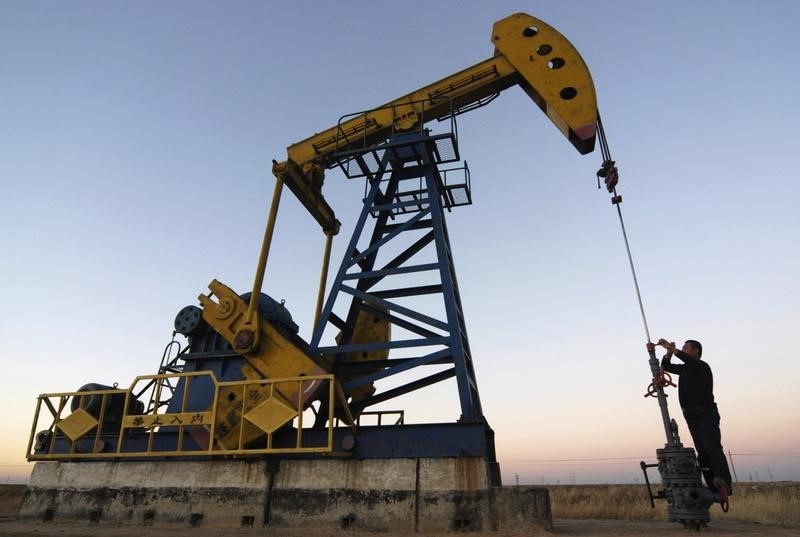* First Americans could get vaccine by mid Dec-top health
official
* Market eyes OPEC+ meeting at month-end
* Russia's small oil producers struggle with output cuts
By Jessica Jaganathan
SINGAPORE, Nov 23 (Reuters) - Oil prices extended their
gains on Monday as traders were optimistic about a recovery in
crude demand thanks to successful coronavirus vaccine trials,
but price gains were contained by renewed lockdowns in several
countries.
Sentiment was also bolstered by hopes that the Organization
of the Petroleum Exporting Countries (OPEC), Russia and other
producers, a group known as OPEC+, will keep crude output in
check.
Brent crude futures LCOc1 rose 17 cents, or 0.4%, to
$45.13 a barrel by 0039 GMT while U.S. West Texas Intermediate
crude CLc1 gained 4 cents, or 0.1%, to $42.46 a barrel. Both
benchmarks had increased by 5% last week.
"Positive sentiment continues to be driven by the recent
good news about the efficacy of coronavirus vaccines in
development and the expectation that the OPEC+ meeting at the
end of this month could see the group extend current cuts by 3-6
months," said Stephen Innes, Chief Global Markets Strategist at
axi.
U.S. healthcare workers and others recommended that the
nation's first COVID-19 inoculations could start getting shots
within a day or two of regulatory consent next month, a top
official of the government's vaccine development effort said on
Sunday. Dr. Moncef Slaoui, chief scientific adviser for "Operation
Warp Speed", said the U.S. Food and Drug Administration (FDA)
would likely grant approval in mid-December for distribution of
the vaccine produced by Pfizer Inc PFE.N and German partner
BioNTech 22UAy.DE , launching the largest inoculation campaign
in U.S. history.
Elsewhere, OPEC+, which meets on Nov. 30 and Dec. 1, is
looking at options to delay by at least three months from
January the tapering of their 7.7 million barrel per day (bpd)
cuts by around 2 million bpd.
But smaller Russian oil companies are still planning to pump
more crude this year despite a global deal to cut production as
they have little leeway in managing the output of start-up
fields, a group representing the producers said on Friday.
- English (USA)
- English (UK)
- English (India)
- English (Canada)
- English (Australia)
- English (South Africa)
- English (Nigeria)
- Deutsch
- Español (España)
- Español (México)
- Français
- Italiano
- Nederlands
- Português (Portugal)
- Polski
- Português (Brasil)
- Русский
- Türkçe
- العربية
- Ελληνικά
- Svenska
- Suomi
- עברית
- 日本語
- 한국어
- 简体中文
- 繁體中文
- Bahasa Indonesia
- Bahasa Melayu
- ไทย
- Tiếng Việt
- हिंदी
Oil prices extend gains on COVID vaccine hopes
Published 11/23/2020, 09:00 AM
Updated 11/23/2020, 09:10 AM
Oil prices extend gains on COVID vaccine hopes

Latest comments
Install Our App
Risk Disclosure: Trading in financial instruments and/or cryptocurrencies involves high risks including the risk of losing some, or all, of your investment amount, and may not be suitable for all investors. Prices of cryptocurrencies are extremely volatile and may be affected by external factors such as financial, regulatory or political events. Trading on margin increases the financial risks.
Before deciding to trade in financial instrument or cryptocurrencies you should be fully informed of the risks and costs associated with trading the financial markets, carefully consider your investment objectives, level of experience, and risk appetite, and seek professional advice where needed.
Fusion Media would like to remind you that the data contained in this website is not necessarily real-time nor accurate. The data and prices on the website are not necessarily provided by any market or exchange, but may be provided by market makers, and so prices may not be accurate and may differ from the actual price at any given market, meaning prices are indicative and not appropriate for trading purposes. Fusion Media and any provider of the data contained in this website will not accept liability for any loss or damage as a result of your trading, or your reliance on the information contained within this website.
It is prohibited to use, store, reproduce, display, modify, transmit or distribute the data contained in this website without the explicit prior written permission of Fusion Media and/or the data provider. All intellectual property rights are reserved by the providers and/or the exchange providing the data contained in this website.
Fusion Media may be compensated by the advertisers that appear on the website, based on your interaction with the advertisements or advertisers.
Before deciding to trade in financial instrument or cryptocurrencies you should be fully informed of the risks and costs associated with trading the financial markets, carefully consider your investment objectives, level of experience, and risk appetite, and seek professional advice where needed.
Fusion Media would like to remind you that the data contained in this website is not necessarily real-time nor accurate. The data and prices on the website are not necessarily provided by any market or exchange, but may be provided by market makers, and so prices may not be accurate and may differ from the actual price at any given market, meaning prices are indicative and not appropriate for trading purposes. Fusion Media and any provider of the data contained in this website will not accept liability for any loss or damage as a result of your trading, or your reliance on the information contained within this website.
It is prohibited to use, store, reproduce, display, modify, transmit or distribute the data contained in this website without the explicit prior written permission of Fusion Media and/or the data provider. All intellectual property rights are reserved by the providers and/or the exchange providing the data contained in this website.
Fusion Media may be compensated by the advertisers that appear on the website, based on your interaction with the advertisements or advertisers.
© 2007-2025 - Fusion Media Limited. All Rights Reserved.